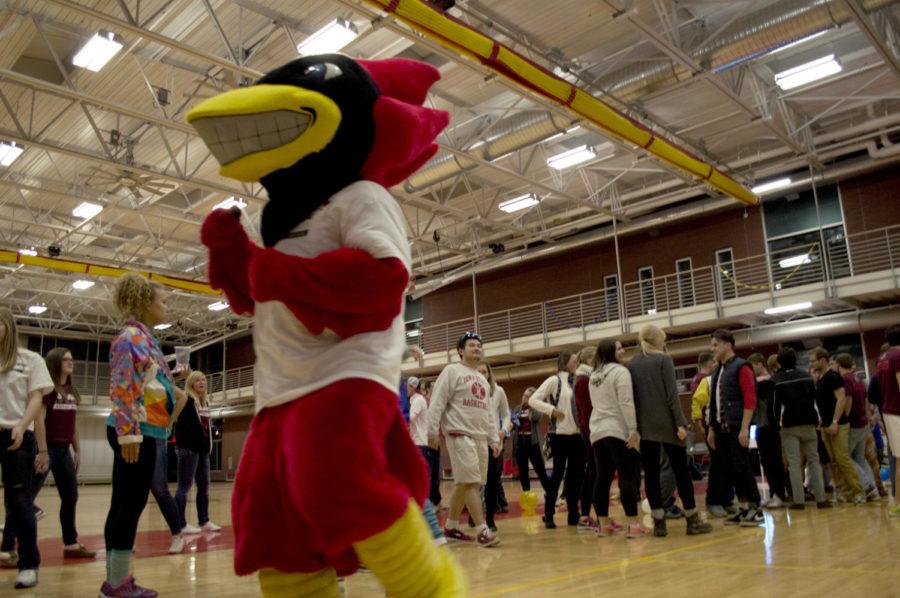ISU fights cancer with Up ’til Dawn
November 17, 2014
Members of the Cyclone Martial Arts Club lock into a fighting stance in front of posters of children with cancer. Across State Gym, ISU students loaded with six cases of energy drinks and a mountain of potato chips gear up to fight cancer.
Up ’til Dawn, an annual event to raise money for St. Jude Children’s Research Hospital, took place on Nov. 14 to 25 from 11:30 p.m. to 6 a.m. A total of $58,200 was raised during this year’s event.
Caleb Prohaska, senior in construction engineering, was the co-director of Up ’til Dawn and said his fraternity, Tau Kappa Epsilon, is one of the reasons he is so involved with St. Jude’s. Last year, his fraternity raised $14,000 alone, Prohaska said.
“With St. Jude’s, it’s not a tough sell. The money that is donated is going basically directly to a family and directly to saving a child’s life. I’m not saying other philanthropies aren’t legitimate; it’s just that people can find a connection because a lot of family members have kids or they have nieces and nephews,” Prohaska said. “They just have that connection thinking about, ‘If my child were to have this, how would I want the family to be treated?’”
Throughout the event, students danced, made crafts, ate walking tacos, took pictures with Cy and watched a demonstration from the Cyclone Martial Arts Club after hearing stories from cancer survivors.
While Emma Dostal, senior in biology, never had cancer as a child, she and her three siblings were young when her mother, Becky, was diagnosed with a form of leukemia called multiple myeloma seven years ago.
“My first thought was, ‘What am I going to do without my mom?'” Dostal said. “I bawled my eyes out because they gave her six months to live. What I saw was that I was going to lose my mom and then I was going to have to step up and be mom for [her three younger siblings].”
“It’s a bitch,” Dostal said of cancer.
Dostal’s father had quit his job a few days before her mother’ diagnosis, so 15-year-old Dostal said she took it upon herself to become independent and pay for whatever she could. Dostal said even though children will still be diagnosed with cancer, she feels it is important that people can realize providing financial stability for families who have children with cancer is still beneficial.
Prohaska said he is glad to see students realizing that every bit they donate helps a family, and it helps keep the dream for a cure alive.
“There is a one dollar bill out of a thousand. You have to understand that what you are doing is making a difference. What people have to realize is that there is a light at the end of the tunnel. You keep searching for that cure,” Prohaska said.
Though Becky’s cancer is stabilized, she still goes in for chemotherapy periodically when her white blood cell counts rise. After she had an autologous bone marrow transplant, Becky’s immune system is as weak as that of a 7-year-old’s, which Dostal said is terrifying for her and her family.
“I would get so angry when my mom was in the hospital because you can look outside and see people taking smoke breaks,’ Dostal said. “My mom never smoked, never did drugs, took really great care of her body. For me it’s like, seriously she’s the one that’s sick and the ones that are out there destroying their bodies are left there.”
But Dostal said her parents don’t give anger or fear a chance to take over.
“My parents say, ’These are the cards we’ve been dealt. You can sit around and pout about it, or you can just buck up and find a way to push through it,’ and that’s what we do,” Dostal said.
After going into remission, Dostal said her family moved to Colorado, and her mother fulfilled her dream of opening a gym.
Dostal said she was recently at a martial arts presentation where they spoke about how women have always been fighters, and Dostal said she thought of her mom the whole time.
“Eventually that is going to be what gets my mom: that cancer. It’s not like we’re going to wake up tomorrow and she’s going to be gone, but someday it’s just going to take its toll and win,” Dostal said.
Prohaska said he had the opportunity to visit St. Jude’s last year, an experience he is so excited to remember he bounces on the balls of his feet.
“There’s really no one charity, no one disease that’s necessarily better. The thing about cancer and the thing about St. Jude’s is that they’re really working to put themselves out of business and cancer as a whole out of business. Ultimately it’s about bringing people together,” Prohaska said.
“The hospital itself is so positive and uplifting. That’s really part of the cure. It’s more than just the cutting-edge technology and treatments, it’s really about the positivity,” Prohaska said.







